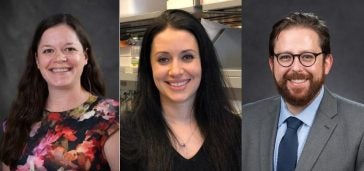
A Warm Welcome to
Dr. Lindsay Green-Gavrielidis, Salve Regina University
Dr. Kristin Scaplen, Bryant University
Dr. Tyler Stack, Providence College
“Assessing the impact of harmful macroalgal blooms on costal environmental health.” Dr. Lindsay Green-Gavrielidis, Assistant Professor, Salve Regina University
The goal of Dr. Green-Gavrielidis’ ECD project is assessing the impacts of harmful macroalgal blooms on higher trophic levels and coastal environmental health. Her research focuses on the understudied impact of green macroalgal toxins to develop an easy screening protocol. Specific objectives are to assess the sublethal and lethal impacts of green tide toxins on higher trophic levels and develop screening protocols to assess green tide impacts in real time. Seaweeds, a vital component of nearshore marine ecosystems, form the base of marine food webs and can serve as habitat for invertebrates and small fish. Harmful macroalgal blooms, large heaps of drifting macroalgae accumulating in shallow low wave energy environments, are usually driven by excess nutrients and reduced herbivory.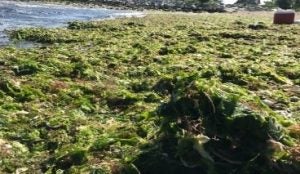
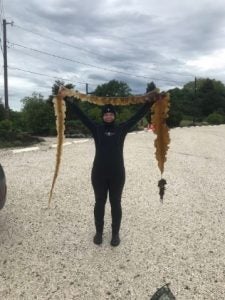 Green tides are prevalent harmful macroalgal blooms that are widespread globally and domestically. “Green tides have extensive ecological and economic impacts that can disrupt food webs and human food supply and can interfere with recreation and tourism and produce harmful toxins (e.g. dopamine) that negatively impact organisms or release noxious odors that are respiratory irritants.”
Green tides are prevalent harmful macroalgal blooms that are widespread globally and domestically. “Green tides have extensive ecological and economic impacts that can disrupt food webs and human food supply and can interfere with recreation and tourism and produce harmful toxins (e.g. dopamine) that negatively impact organisms or release noxious odors that are respiratory irritants.”
Dr. Green-Gavrielidis is passionate about teaching in the classroom, lab, and field and hopes to continue to inspire people to appreciate, study, and conserve the natural world. Her ultimate goal is “for people to gain an appreciation for the role of seaweeds and other overlooked organisms that serve vital roles in maintaining the health of our coastal ecosystems.” She enjoys introducing people to edible seaweeds and hopes that eating seaweed alongside oysters, lobsters, and fish will become a standard societal practice.
Dr. Lindsay Green-Gavrielidis received her B.S. (biology) and M.Sc. (marine biology) degrees from Northeastern University, completed her doctorate (plant biology) at the University of New Hampshire (studying seaweed physiology and aquaculture), and her postdoctoral training at the University of Rhode Island (ecology and physiology of harmful macroalgal blooms in Narragansett Bay). She joined the Biology and Biomedical Sciences Department at Salve Regina University (SRU) in 2019 and is an Assistant Professor.
“Neural mechanisms underlying maladaptive reward memories in Drosophila.” 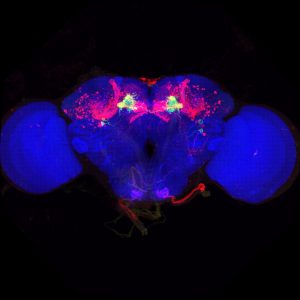 Dr. Kristin Scaplen, Assistant Professor, Bryant University
Dr. Kristin Scaplen, Assistant Professor, Bryant University
Dr. Kristin Scaplen graduated from the University of Connecticut with a B.Sc in Biology and a B.Sc in Psychology. She received her PhD from Brown University in Neuroscience under the mentorship of Dr. Rebecca Burwell (who has served as a RI-INBRE faculty mentor) and then completed a postdoc, also at Brown, under the mentorship of Dr. Karla Kaun, a former RI-INBRE investigator who was funded by COBRE at the time of Dr. Scaplen’s postdoc. Dr. Scaplen’s research background is quite broad but rooted in understanding neural circuitry mechanisms underlying learning and memory. She started studying this in rodents as an undergraduate and graduate student and moved to the Drosophila model during her postdoc, largely because of the impressive neurogenetic tools available in flies that permit dissection of circuits underlying complex behavior with unprecedented temporal and spatial resolution.
 She is particularly interested in understanding how learning and memory processes are disrupted by drugs of abuse to drive maladaptive behaviors. As a postdoc, she defined local circuits that were important for the acquisition, consolidation, and expression of alcohol reward and identified downstream structures/subsets of neurons where these circuits converge. “My fascination with the brain began in a lecture hall as an undergraduate when I took an Introduction to Neuroscience class,” she says. “When I realized how much we still don’t know about the brain and the fact that people were actively trying to broaden our knowledge, I knew it was something I wanted to do. The idea of contributing to our understanding of the brain and improving the human condition was really exciting to me.” The focus of her current work is to define the role of these downstream structures in alcohol reward memories and understand how circuitry dynamics change while flies learn to associate cues with alcohol intoxication to result in long-lasting preferences.
She is particularly interested in understanding how learning and memory processes are disrupted by drugs of abuse to drive maladaptive behaviors. As a postdoc, she defined local circuits that were important for the acquisition, consolidation, and expression of alcohol reward and identified downstream structures/subsets of neurons where these circuits converge. “My fascination with the brain began in a lecture hall as an undergraduate when I took an Introduction to Neuroscience class,” she says. “When I realized how much we still don’t know about the brain and the fact that people were actively trying to broaden our knowledge, I knew it was something I wanted to do. The idea of contributing to our understanding of the brain and improving the human condition was really exciting to me.” The focus of her current work is to define the role of these downstream structures in alcohol reward memories and understand how circuitry dynamics change while flies learn to associate cues with alcohol intoxication to result in long-lasting preferences.
Dr. Scaplen is excited to bring Neuroscience to the Bryant community and engage undergraduates in the research process and is looking forward to expanding her own research network and form new collaborations within the RI-INBRE community. “Bryant’s mission places emphasis on developing innovating leaders. In science, innovative ideas are the foundation of discovery and there is still a lot to discover and understand,” she says. “I hope to inspire students to see themselves as active contributors to science. The health sciences field will only benefit from diverse perspectives and ideas.”
“Identifying and quantifying drug metabolism by the human gut microbiome.” Dr. Tyler Stack, Assistant Professor of Chemistry and Biochemistry, Providence College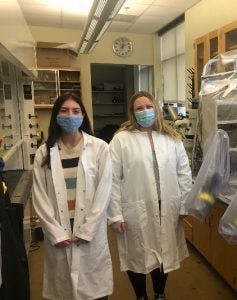
Dr. Tyler Stack received his bachelor’s degree in Chemistry at the University of Minnesota–Twin Cities and worked in Dr. Marc Hillmyer’s lab making “green” monomers to create biodegradable plastics. He learned that an enzyme could perform the exact reaction he wanted and became interested in how enzymes can catalyze reactions. “As part of my undergraduate thesis, I wanted a catalyst to perform a green oxidation reaction, with goals to occur in water, at room temperature, and with no toxic chemicals,” he says. “I found an enzyme that performed my exact reaction in water at room temperature, using molecular oxygen as the oxidant. A catalyst doesn’t get much better than an enzyme, and I was upset that I had no idea how to get that enzyme and use it as a catalyst.” He attended the University of Texas at Austin for his Ph.D. in Biochemistry working with Dr. Chris Whitman to study the bacterial catabolism of halogenated aromatic compounds. Dr. Stack had a postdoctoral research position with Dr. John Gerlt at the University of Illinois at Urbana-Champaign where he focused on large-scale bacterial enzyme functional assignments, including discovering and characterizing a catabolic pathway for Vitamin C in bacteria.
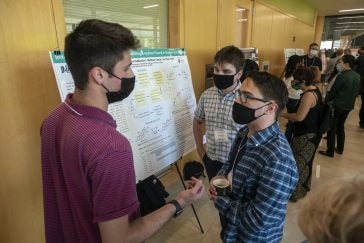 Dr. Stack’s research career has been centered around his interest in how enzymes work and discovering their function. As a graduate student, he noticed the growing interest and tools to investigate the human gut microbiome. Given the disparity between bacterial genomic sequencing and the functional annotation to confidently predict their metabolism, he became fascinated with the gut microbiome’s diversity and dynamic composition, along with their direct impact on human health. “The trillions of microbes that inhabit our guts help metabolize the food we eat, and this metabolism can be specific or promiscuous to respond to our changing diets,” he says. “We need enzymes to be specific, and the best example is DNA polymerase. Making errors generally leads to cell death and cancer in our cells. No enzyme is perfect, and mistakes have to be rectified by our many DNA repair enzymes. However, there needs to be some promiscuity because there would be no evolution without errors in DNA polymerase!” Most of the enzymes in these bacteria are of unknown function, and his current research interests focus on the promiscuity of enzymes and the metabolic “mischief” they can incur on us as their hosts. His ECD research project focuses on this “accidental” metabolism by bacteria in the human gut and how they change the structure of the drugs we ingest. Although the function of an enzyme is not likely to metabolize a specific drug, a growing field of research identifies drug-metabolizing enzymes found in gut bacteria. “Enzymatic promiscuity has consequences when it comes to how our gut microbiome changes the efficacy of cancer therapeutics. One example is the deglycosylation of the anticancer drug capecitabine
Dr. Stack’s research career has been centered around his interest in how enzymes work and discovering their function. As a graduate student, he noticed the growing interest and tools to investigate the human gut microbiome. Given the disparity between bacterial genomic sequencing and the functional annotation to confidently predict their metabolism, he became fascinated with the gut microbiome’s diversity and dynamic composition, along with their direct impact on human health. “The trillions of microbes that inhabit our guts help metabolize the food we eat, and this metabolism can be specific or promiscuous to respond to our changing diets,” he says. “We need enzymes to be specific, and the best example is DNA polymerase. Making errors generally leads to cell death and cancer in our cells. No enzyme is perfect, and mistakes have to be rectified by our many DNA repair enzymes. However, there needs to be some promiscuity because there would be no evolution without errors in DNA polymerase!” Most of the enzymes in these bacteria are of unknown function, and his current research interests focus on the promiscuity of enzymes and the metabolic “mischief” they can incur on us as their hosts. His ECD research project focuses on this “accidental” metabolism by bacteria in the human gut and how they change the structure of the drugs we ingest. Although the function of an enzyme is not likely to metabolize a specific drug, a growing field of research identifies drug-metabolizing enzymes found in gut bacteria. “Enzymatic promiscuity has consequences when it comes to how our gut microbiome changes the efficacy of cancer therapeutics. One example is the deglycosylation of the anticancer drug capecitabine
